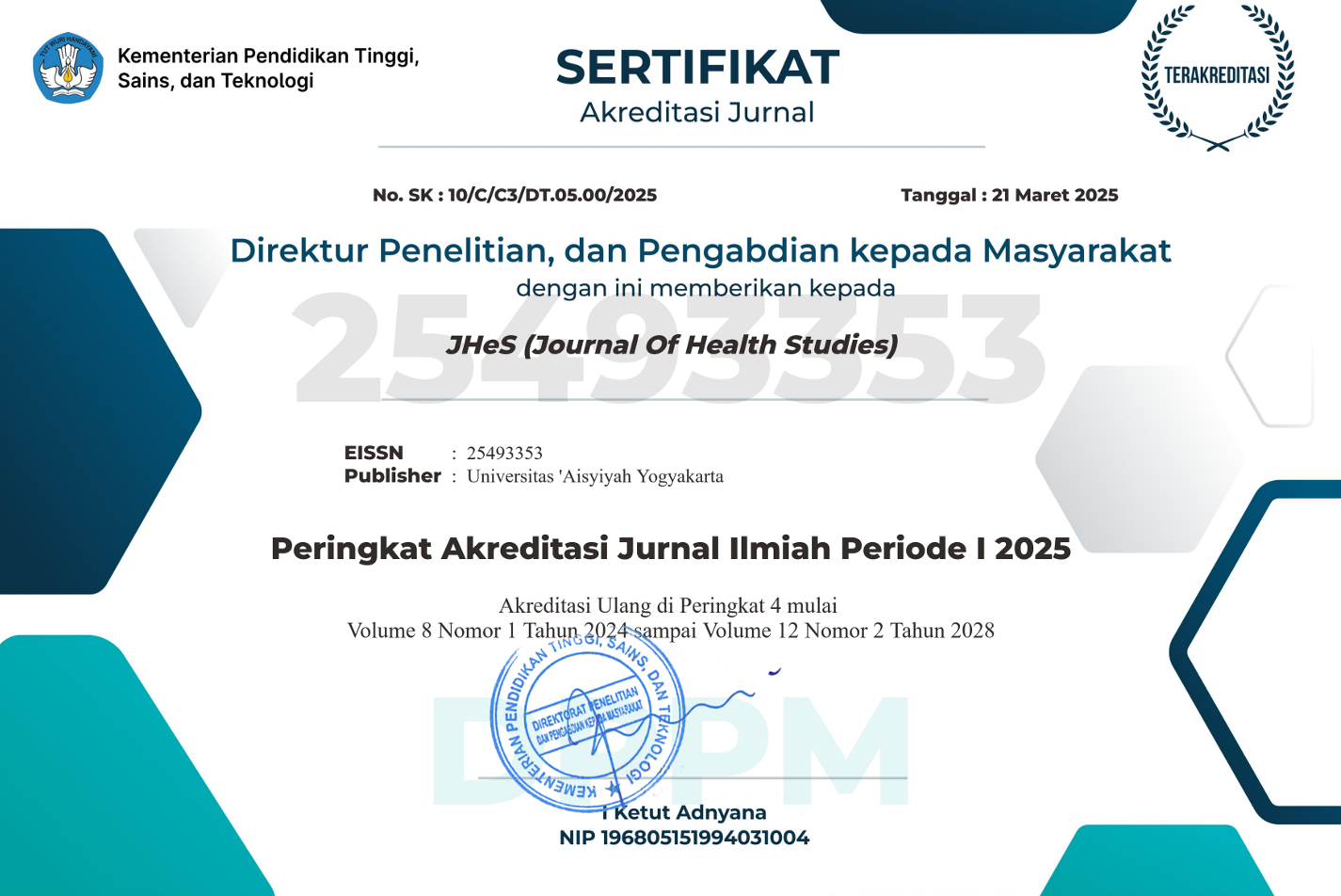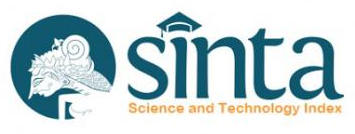The correlation between mental health and eating behavior in Indonesian college students: a cross-sectional study
DOI:
https://doi.org/10.31101/jhes.4023Abstract views 797 times
Keywords:
eating behavior, mental health, studentsAbstract
Downloads
References
Abdel Wahed, W. Y., & Hassan, S. K. (2017). Prevalence and associated factors of stress, anxiety and depression among medical Fayoum University students. Alexandria Journal of Medicine, 53(1), 77–84. https://doi.org/10.1016/j.ajme.2016.01.005
Acharya, L., Jin, L., & Collins, W. (2018). College life is stressful today–Emerging stressors and depressive symptoms in college students. Journal of American College Health, 66(7), 655–664. https://doi.org/10.1080/07448481.2018.1451869
Al-Musharaf, S. (2020). Prevalence awend predictors of emotional eating among healthy young saudi women during the COVID-19 pandemic. Nutrients, 12(10), 1–17. https://doi.org/10.3390/nu12102923
Centers for Disease Control and Prevention. 2019. Youth Risk Behavior Survey. Data Summary & Trends Report 2009-2019. : 108. www.cdc.gov/healthyyouth%0Ahttps://www.cdc.gov/healthyyouth/data/yrbs/pdf/YRBSDataSummaryTrendsReport2019-508.pdf.
D, I. (2016). Stress-Related Weight Gain: Mechanisms Involving Feeding Behavior, Metabolism, Gut Microbiota and Inflammation. Journal of Nutrition & Food Sciences, 06(01), 1–6. https://doi.org/10.4172/2155-9600.1000457
Demenech, L. M., Oliveira, A. T., Neiva-Silva, L., & Dumith, S. C. (2021). Prevalence of anxiety, depression and suicidal behaviors among Brazilian undergraduate students: A systematic review and meta-analysis. Journal of Affective Disorders, 282, 147–159. https://doi.org/10.1016/j.jad.2020.12.108
Ghasemi, F., Beversdorf, D. Q., & Herman, K. C. (2024). Stress and stress responses: A narrative literature review from physiological mechanisms to intervention approaches. Journal of Pacific Rim Psychology, 18. https://doi.org/10.1177/18344909241289222
Hernández-Torrano, D., Ibrayeva, L., Sparks, J., Lim, N., Clementi, A., Almukhambetova, A., Nurtayev, Y., & Muratkyzy, A. (2020). Mental Health and Well-Being of University Students: A Bibliometric Mapping of the Literature. Frontiers in Psychology, 11(June), 1–16. https://doi.org/10.3389/fpsyg.2020.01226
Indonesia National Adolescent Mental Health Survei. (2022). National Adolescent Mental Health Survey (I-NAMHS) Laporan Penelitian. Mental Health, xviii. https://qcmhr.org/outputs/reports/12-i-namhs-report-bahasa-indonesia
Jenkins, T., Nguyen, J., Polglaze, K., & Bertrand, P. (2016). Influence of Tryptophan and Serotonin on Mood and Cognition with a Possible Role of the Gut-Brain Axis. Nutrients, 8(1), 56. https://doi.org/10.3390/nu8010056
Kotera, Y. (2021). Mental health of Malaysian university students : UK comparison , and relationship between negative mental health attitudes , self-compassion , and resilience. 403–419.
Kotera, Y., Ting, S. H., & Neary, S. (2021). Mental health of Malaysian university students: UK comparison, and relationship between negative mental health attitudes, self-compassion, and resilience. Higher Education, 81(2), 403–419. https://doi.org/10.1007/s10734-020-00547-w
Mansouri, T., Hostler, D., Temple, J. L., & Clemency, B. M. (2022). Eating and Physical Activity Patterns in Day and Night Shift EMS Clinicians. Prehospital Emergency Care, 26(5), 700–707. https://doi.org/10.1080/10903127.2021.1996662
Mohamad, N. E., Sidik, S. M., Akhtari-zavare, M., & Gani, N. A. (2021). The prevalence risk of anxiety and its associated factors among university students in Malaysia : a national cross- sectional study. 1–13.
Muniandy, N. D., Fatin Aisyah Yusoff, & Agil Dhiemitra Aulia Dewi. (2024a). Effect of Food Intake on Mood in Higher Education Institute Students in Malaysia. Environment-Behaviour Proceedings Journal, 9(28), 11–17. https://doi.org/10.21834/e-bpj.v9i28.5913
Muniandy, N. D., Fatin Aisyah Yusoff, & Agil Dhiemitra Aulia Dewi. (2024b). Effect of Food Intake on Mood in Higher Education Institute Students in Malaysia. Environment-Behaviour Proceedings Journal, 9(28), 11–17. https://doi.org/10.21834/e-bpj.v9i28.5913
Quehl, R., Haines, J., Lewis, S. P., & Buchholz, A. C. (2017). Food and Mood: Diet Quality is Inversely Associated with Depressive Symptoms in Female University Students. Canadian Journal of Dietetic Practice and Research, 78(3), 124–128. https://doi.org/10.3148/cjdpr-2017-007
RI, K. B. (2023). Survey Kesehatan Indonesia (SKI) Dalam Angka Dalam Angka. In SKI 2023.
Riskesdas, K. (2018). Hasil Utama Riset Kesehata Dasar (RISKESDAS). In Riset Kesehatan Dasar Departemen Kesehatan Republik Indonesia (Vol. 44, Issue 8). https://doi.org/10.1088/1751-8113/44/8/085201
Rohmah, N. (2022). The Stress And Emotional Eating Behavior In Students Of Universitas Negeri Semarang. Nutrizione: Nutrition Research And Development Journal, 2(1), 10–18. https://doi.org/10.15294/nutrizione.v2i1.55170
Salehi, M., Zamiri, A., Kim, J., Texeira, C., Shah, K., & Gunturu, S. (2024). Exploring the Psychiatric Manifestations of Primary Sjögren’s Syndrome: A Narrative Review. International Journal of Rheumatology, 2024, 1–10. https://doi.org/10.1155/2024/5520927
Santana, J. da M., Milagres, M. P., Silva Dos Santos, C., Brazil, J. M., Lima, E. R., & Pereira, M. (2021). Dietary intake of university students during COVID-19 social distancing in the Northeast of Brazil and associated factors. Appetite, 162, 105172. https://doi.org/10.1016/j.appet.2021.105172
Schlundt, D. G., Hargreaves, M. K., & Buchowski, M. S. (2003). The Eating Behavior Patterns Questionnaire predicts dietary fat intake in African American women. Journal of the American Dietetic Association, 103(3), 338–345. https://doi.org/10.1053/jada.2003.50049
Sulistyadewi, N. P. E., & Masitah, R. (2020). Asupan Karbohidrat Dan Lemak Dari Konsumsi Makanan Jajanan Terhadap Status Gizi Pada Remaja. Jurnal Kesehatan Terpadu, 4(2), 52–56.
Sundarasen, S., Chinna, K., Kamaludin, K., Nurunnabi, M., Baloch, G. M., Khoshaim, H. B., Hossain, S. F. A., & Sukayt, A. (2020). Psychological impact of covid-19 and lockdown among university students in malaysia: Implications and policy recommendations. International Journal of Environmental Research and Public Health, 17(17), 1–13. https://doi.org/10.3390/ijerph17176206
Vidal, E. J., Alvarez, D., Martinez-Velarde, D., Vidal-Damas, L., Yuncar-Rojas, K. A., Julca-Malca, A., & Bernabe-Ortiz, A. (2018). Perceived stress and high fat intake: A study in a sample of undergraduate students. PloS One, 13(3), e0192827. https://doi.org/10.1371/journal.pone.0192827
World Health Organisation. 2022. Mental Health : Strengthening Our Response. Fact sheet N.220. http://www.who.int/mediacentre/factsheets/fs220/en/
Zahrah, N. I., Fanani, M., & Ardyanto, T. D. (2023). The Relationship Between Emotional Eating, Meal Skipping and Unhealthy Food Consumption Pattern in Adolescent Girls. The Indonesian Journal of Public Health, 18(1), 47–58. https://doi.org/10.20473/ijph.v18i1.2023.47-58
Zulkarnain, S., & Muniroh, L. (2023). Hubungan Stress Akademik dan Emotional Eating dengan Status Gizi Pada Mahasiswa Tingkat Akhir. Jurnal Kesehatan Tambusai, 4(3), 4112–4117.
Downloads
Published
Issue
Section
License
Copyright (c) 2025 JHeS (Journal of Health Studies)

This work is licensed under a Creative Commons Attribution-ShareAlike 4.0 International License.
With the receipt of the article by the Journal of Health Studies Editorial Board and the decision to be published, then the copyright regarding the article will be diverted to Journal of Health Studies. Universitas 'Aisyiyah Yogyakarta as the publisher of Journal of Health Studies hold the copyright regarding all the published articles in this journal.
Journal of Health Studies is licensed under a Creative Commons Attribution-ShareAlike 4.0 International License.













